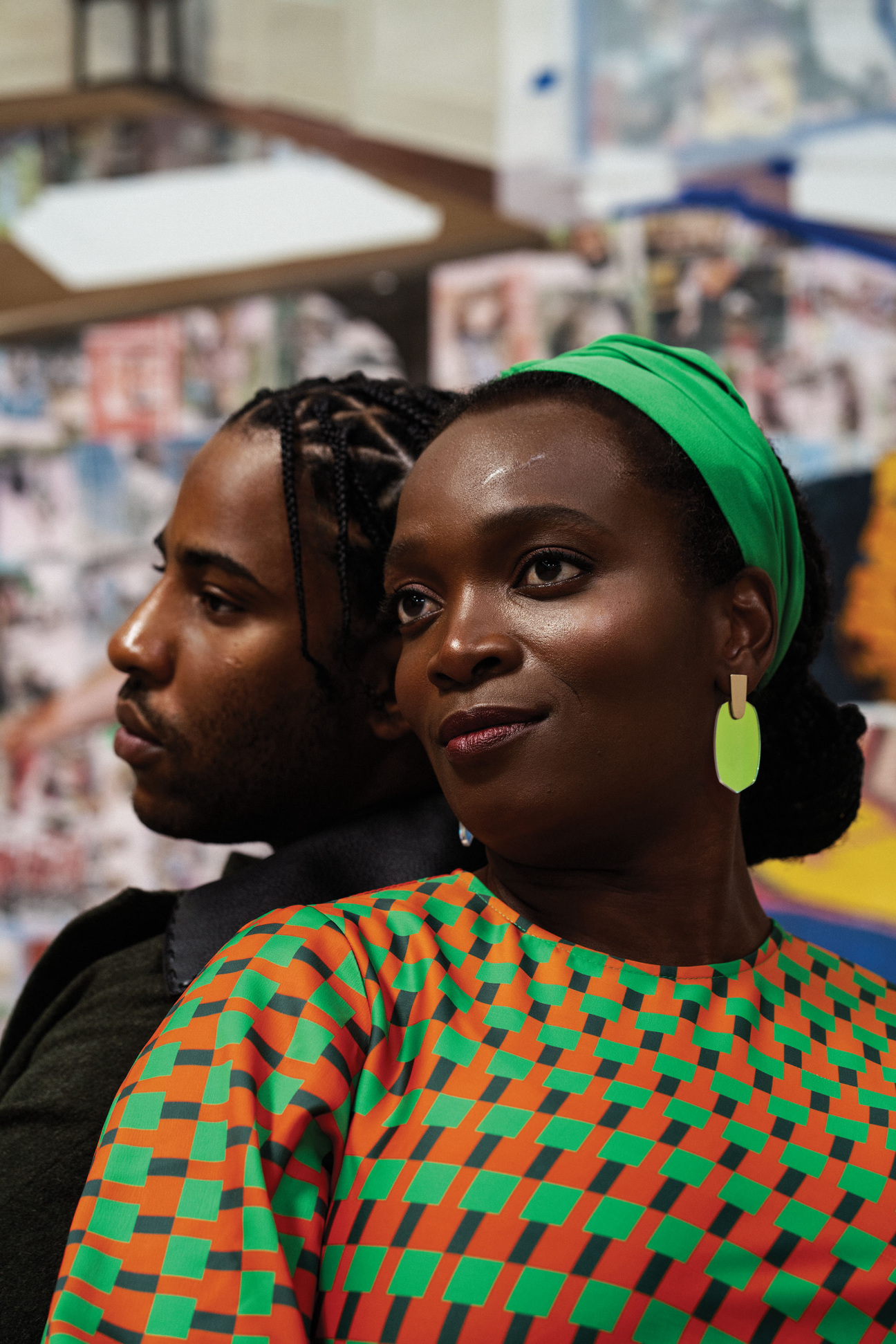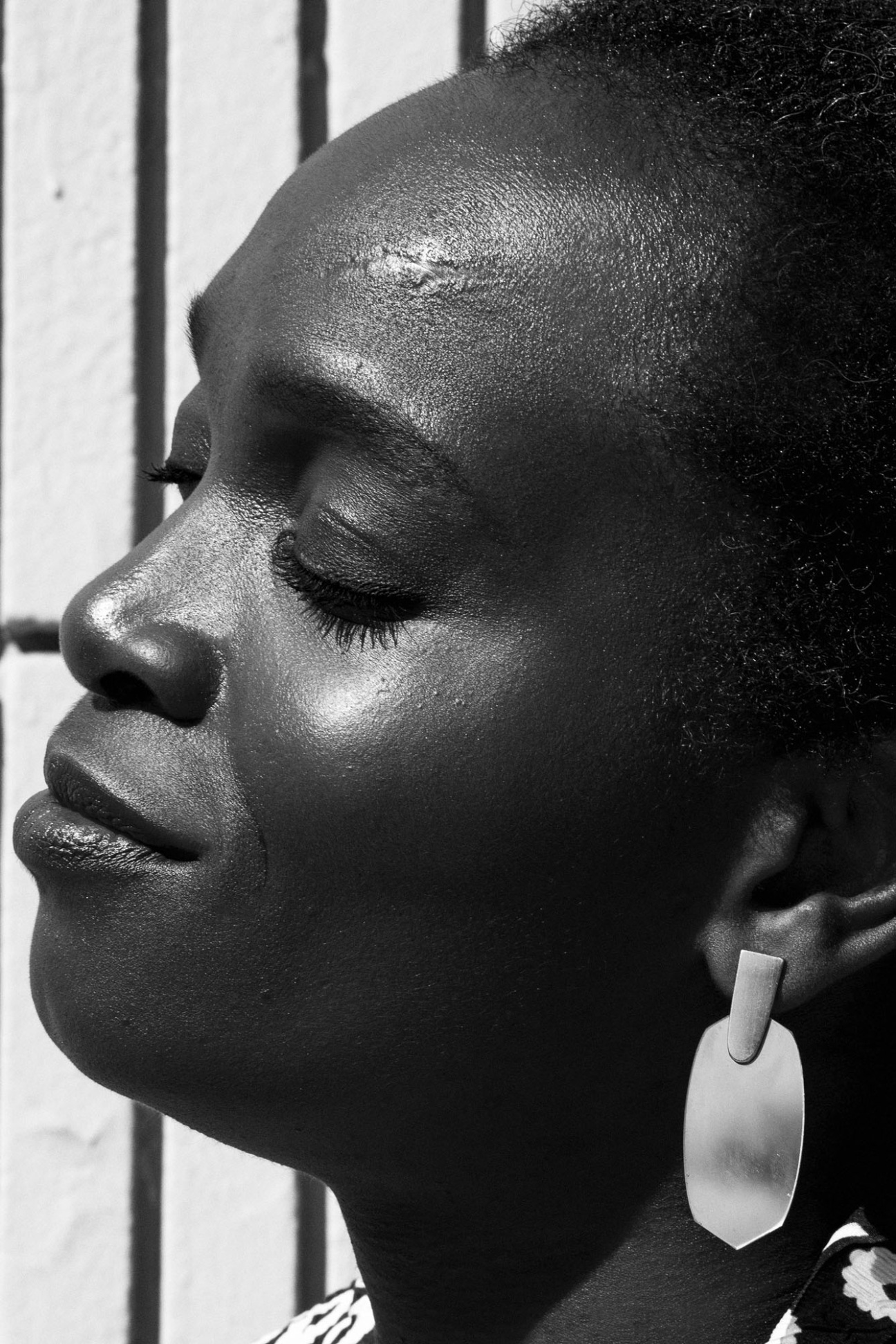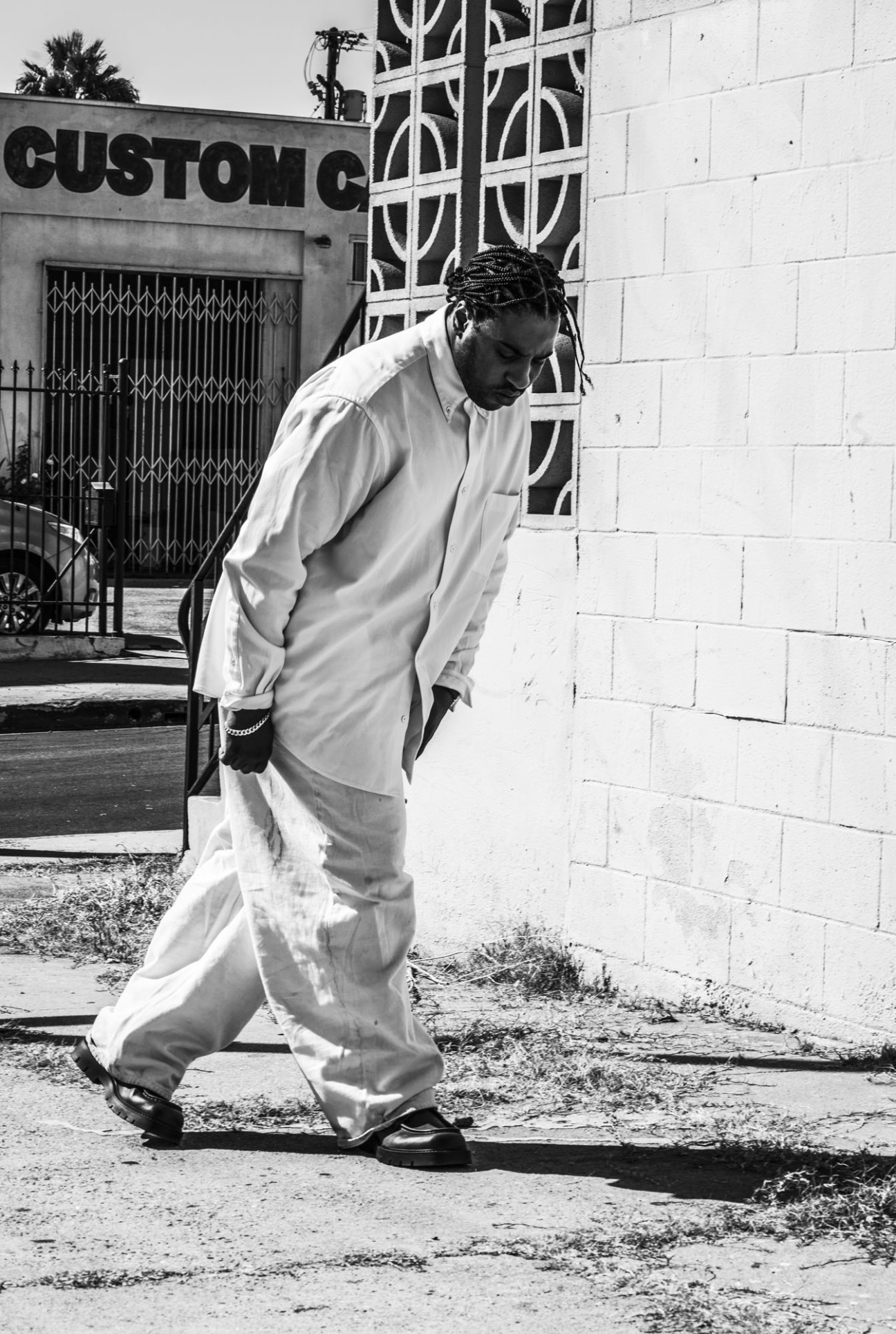Pre-order the inaugural Artists on Artists issue, featuring this conversation, alongside others between Venus Williams and Titus Kaphar and Amy Sherald and Jon Batiste, here.
Njideka Akunyili Crosby begins every piece by identifying her viewer’s place within it. Are they peering at the scene as if through a window? Are they so close to her figures that they’re tempted to sit down beside them?
It’s this ability to conjure intimacy from all angles that makes the Nigerian artist’s collaged paintings so transfixing. Akunyili Crosby, now 41, was just a teenager when she left Lagos for the U.S. After completing an MFA at Yale and a residency at the Studio Museum in Harlem, she carved out a place for herself in the art world with works that filter the dense matter of geopolitics and diaspora through the prism of the quotidian. By assembling images plucked from Nigerian magazines, newspapers, and her own life, the artist depicts unguarded moments between people—sprawled on the living room floor or slouched at the kitchen table—as the full might of their sociocultural context roars around them.
Crosby’s works became crucial guideposts for Malcolm Washington when he began to envision a career in the director’s seat. His debut feature, The Piano Lesson, revels in the same delicate encounters between the historical and the intimately personal that Crosby’s work so deftly alchemizes. Adapted from August Wilson’s play of the same name, the film—featuring Washington’s brother John David as the lead and his father Denzel as a producer—tells the story of generations of Black Americans grappling with displacement and connection, through the tender interactions of a single Depression-era family.
Despite their divergent fields, these two artists are connected by a shared hunger to create work infused with an unwavering sense of self-knowledge. It’s also what brought them together in Crosby’s Los Angeles studio this fall for CULTURED’s Artists on Artists series. Here, the pair discuss what it takes to make a work of art that imbues daily life with the echo of history.

Malcolm Washington: Njideka, I first became aware of your work in 2016 when I was living in New York. A good friend of mine was working at the Studio Museum [in Harlem], where you were an artist in residence. She kept bringing up your name. To sit down with you now and see your growth—and to see your work in the world—has been really, really cool.
Njideka Akunyili Crosby: That’s kind to say. I hadn’t yet seen The Piano Lesson when I was invited to meet with you. Since I wasn’t familiar with your work, I went digging and saw some of the incredible interviews you did around the film’s premiere at the Toronto Film Festival. I got the feeling that we would get along well, so despite my introverted tendencies, this was an easy “yes” for me. I also found a short film of yours, Everything’s for Sale. Did you direct that yourself?
Washington: Wow, I can’t believe you found that. Two friends and I came together to make it.
Akunyili Crosby: It was beautiful! There were moments where I thought, Oh my god, this scene looks like a LaToya Ruby Frazier photo. Oh, this looks like a Deana Lawson picture. I could see those influences coming through. I love when the concrete details of an artist’s vision anchor me into a previously unfamiliar space. This happens when the artist intimately knows their subject. I felt that with Everything’s for Sale, and I felt it again with The Piano Lesson.
“I’m super privileged to come from two parents who know who they are. It’s a big part of my identity—my blood is of that red dirt in North Carolina.” —Malcolm Washington
Washington: l love that that feeling carried through for you because it’s really a focus for me. With The Piano Lesson, I’m working within a larger lineage of artists that came before me, and I am super inspired by that. Earnestness isn’t always respected anymore; people don’t want to be seen trying. But with artists like Kahlil Joseph, Noah Davis—I saw myself in their work right away, and it gave me a certain kind of permission to try. Was there anybody that gave you permission to take a swing like that?
Akunyili Crosby: Yinka Shonibare [CBE RA], a Nigerian-British artist, did that for me. My initial experience seeing Yinka’s work was like what you’re describing—there’s an immediate understanding of it; you know the work. It was one of those moments when you remember getting goosebumps and your hair standing on end. His work reached into my soul, as saccharine as that sounds.
Another person I felt that with was Kerry James Marshall. I remember when I encountered one of his paintings for the first time at the Yale University Art Gallery; it just knocked me over. Kerry also made a subtle yet incredibly powerful piece [Heirlooms & Accessories, 2002] that I think about frequently—more often than almost any other artwork.
Washington: Now you’re in a position to try to give other people that feeling within your own work. How do you create that feeling for somebody?
Akunyili Crosby: It feels odd to say, but I don’t know. I can say that the most beautiful moment for me is when I’m next to somebody viewing the work, and they pick up on some reference in it. For example, I recently gave my eldest sister a print. A few weeks ago, she told me that, now that she has had more time than ever to consider one of my works, there’s a part of me she understands better. She said, “I didn’t know art could do this.”
Washington: Your work is dense—there’s a lot in there. It’s political; it’s geographical; it’s about migration, humanity. Yet it’s very personal. I’m curious how you developed your worldview. How did you learn to articulate it in your practice?
Akunyili Crosby: I’ve lived in distinct places and social stations and I try to mine my experiences in my work.
Washington: Are you conscious of that?
Akunyili Crosby: Yes. I have five siblings, and when we get together we laugh about all of the outrageous experiences from our childhoods—missing school because of botched coups, the neighbors stealing the catfish my mom stocked our pond with, bartering our provisions in boarding school. You probably have these moments too, when you get together with your siblings or people you grew up with, and there’s that magic moment where you all get linked. I came to see that our experiences are unique, and interesting enough to explore and extrapolate from through art. How did it feel when your family watched The Piano Lesson?
“When you get together with your siblings or people you grew up with, there’s that magic moment where you all get linked. I came to see that our experiences are interesting enough to explore through art.” —Njideka Akunyili Crosby
Washington: The film is so personal to me. It’s my family’s stories funneled into this ghost story. So when it was finished, my metric for its success was how my family—the crew and actors too—felt about it. So, I did something crazy: I brought all the actors together, and my mom who I dedicated it to, and a bunch of the crew, and we screened it all together for the first time. When they saw themselves and their families on the screen, that was the ultimate barometer. How did you build the courage to turn your eye on yourself, your family, and your identity?
Akunyili Crosby: That happened in graduate school. I was making works about Nigerian politics, but during studio visits, we always ended up talking about my Nigerian fashion magazines—I had a lot of clippings from them on my studio wall. A single image could unravel complex histories. I distinctly remember a visit with [artist] Deborah Kass telling me, “Njideka, I think this should be in your work.” She encouraged me to turn the focus of my practice to the familiar and familial. Are you up for talking about Everything’s for Sale? The way you bring us into the space made everything feel familiar. I love the scene where the little kid comes in and the grandparents are sitting on the couch.

Washington: We shot it in a two-block radius in a really beautiful neighborhood on the west side of Compton. The woman who owned the house you’re describing was called Miss Betty. We met while I was there knocking on doors scouting, and she opened her door. Her home reminded me so much of my grandmother’s house—the tones and colors. We talk about the Great Migration, when these Black neighborhoods were establishing themselves. At that moment, everyone bought the same trinkets, furniture, and things, and those belongings really mark a moment in time.
Akunyili Crosby: I got the same feeling from The Piano Lesson. I felt like I was being led by somebody who knows this place in their bones.
Washington: In my bones!
Akunyili Crosby: That’s the feeling I want my work to offer. That’s what I gravitate towards. Even if you’re not from that space as a viewer, you know it when you see it.
“The most beautiful moment for me is when I’m next to somebody viewing the work, and they pick up on some reference in it.” —Njideka Akunyili Crosby
Washington: I’m super privileged to come from two parents who know who they are. They have a strong cultural identity, as strong consciousness. It’s a big part of my identity—my blood is of that red dirt in North Carolina. That’s something I’ve tried to bring to all my work, even in The Piano Lesson. You know, when you close your eyes, what your grandmother’s house smells like.
Akunyili Crosby: Every once in a while when I’m making work, I find myself thinking, Why do I always obsess about what’s on the table, or what type of table it is, or what’s on the floor? I read this book on contemporary African literature. The author, Brenda Cooper, had this beautiful line about how many African writers will spend a lot of time describing the things in a kitchen, or the objects on a shelf. History is rooted in the specificity of those little, tiny objects. They really carry the portrait of a place.

Washington: Do you watch movies? What other art forms outside of visual arts do you engage with?
Akunyili Crosby: Literature has influenced me the most, thanks largely to classes I took in grad school with Hazel Carby and Edwige Tamalet Talbayev. It’s not that film has not influenced me, I just don’t have the same framework to analyze it. One thing I’m very aware of is light. Your lighting was delicious!
Washington: We kept it mostly in the warm tones and coppers, keeping the reds in the skin. There’s so much consideration in each part of your work. Have you found the space to change your mind about stuff? Do you ever start over?
Akunyili Crosby: It can be hard to make changes once I get going. I do a lot of planning before I start a work, but I try to set it up in such a way that there’s also wiggle room. I wanted to ask you about point of view. For me, it’s so important. Do I want the viewer to feel like they’re looking through a window? Do I want them to feel they’re enveloped by what’s happening? I was very aware of that in The Piano Lesson. There were moments where I felt like you held my hand and took me through the house. Or where I felt like I was dancing around the table with everyone.
Washington: Yes! That feeling of being together in the moment was the biggest thing I was after.
Akunyili Crosby: I felt it! I was in there with you.
This post was originally published on here







